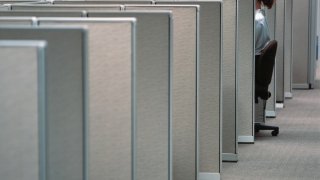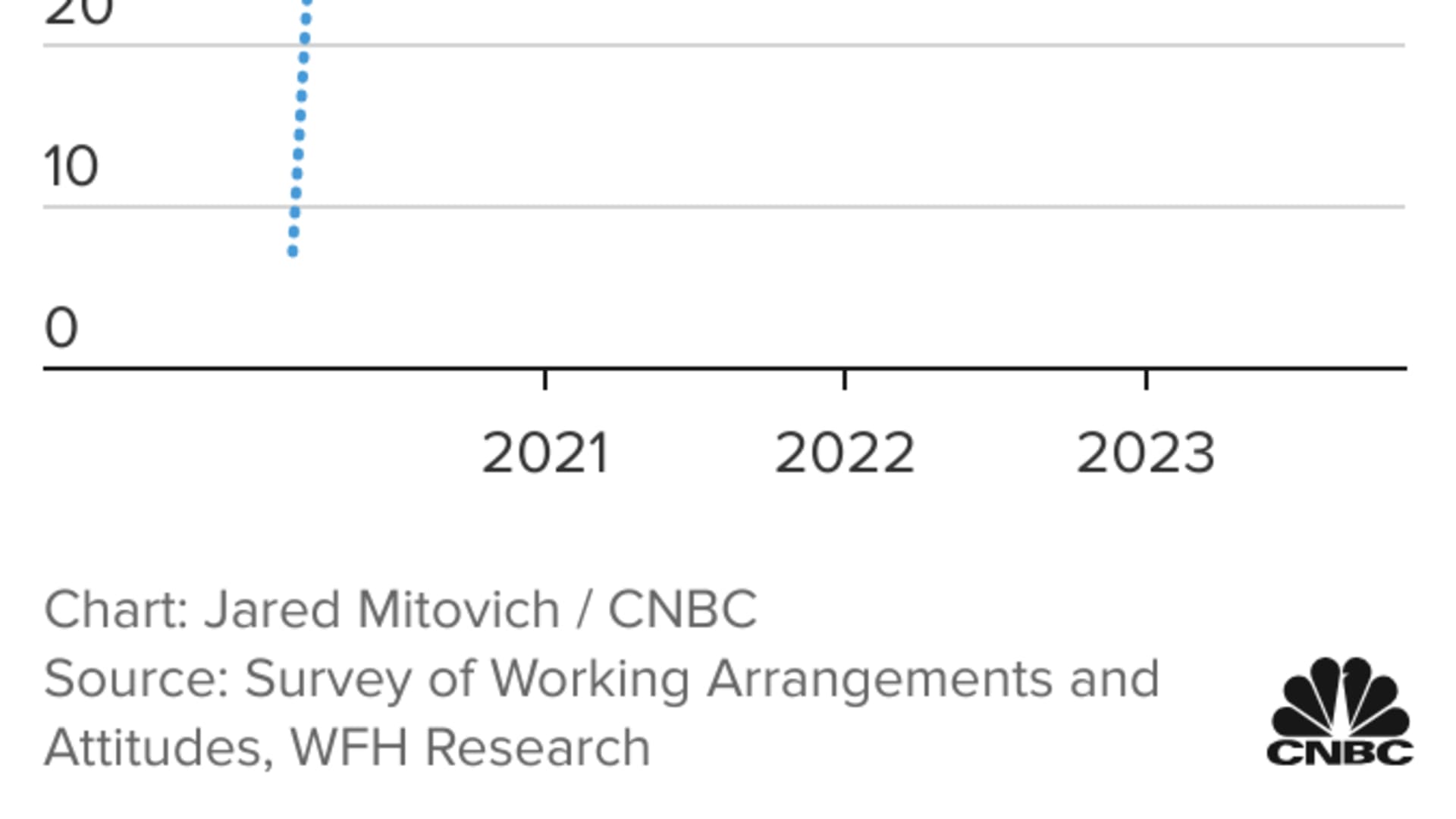
- Sallie Krawcheck, CEO of remote company Ellevest, says her employees are more productive and better at meeting deadlines working from home, but it's clear as a whole the firm is less creative.
- Three years after the pandemic, more CEOs are calling employees back to the office and in some cases tying promotions and higher pay to in-person attendance.
- Remote work experts say that while a hybrid work environment can be optimal, fully remote companies can maintain their edge.
It's been three years since the beginning of the Covid-19 pandemic, when the idea of working from home upended the office landscape for good. While some employers have decided to fully embrace a remote work environment, and experts declare that "return to office is dead," major employers including Amazon and Google are mandating their employees to return to the office, and in some cases, tying promotion and performance reviews to in-person attendance.
Sallie Krawcheck, CEO of Ellevest, an investment and financial literacy platform for women, has been a vocal advocate for remote work. The various benefits — lower fixed costs, a larger talent pool, and added flexibility for women and under-represented groups — factor into why Ellevest has remained fully remote since the pandemic.
At the recent CNBC Workforce Executive Council Summit in New York City, Krawcheck said since going fully remote — a decision that she said was made predominantly as a result of being a lean startup that could not justify the office costs and because the model enabled her to recruit a more diverse workforce — teams have been more productive and successful at hitting deadlines. "We're hitting deadlines like never before," she said. But she added that the one drawback is a less creative company. "Let's have a Zoom to brainstorm? Not many people do it, and you can't run into each other at the coffee machine when you're on Zoom," Krawcheck said. "We are more productive and we are less creative."
Get DFW local news, weather forecasts and entertainment stories to your inbox. Sign up for NBC DFW newsletters.
Krawcheck's opinion isn't unpopular, especially among her former colleagues on Wall Street — she held top posts at Citigroup and Merrill Lynch before founding Ellevest. She described the Wall Street CEO view as often being tied to a "command and control" approach they came up in, and which leads them to still want to see people physically in the office, even if that alone is a weak reason. Among top CEOs who have publicly cited losses in creativity, innovation, and spontaneity to justify RTO mandates, there's JPMorgan CEO Jamie Dimon. When he began the bank's return-to-office campaign in September 2020, he said virtually functioning "with Zoom and Cisco" during the pandemic could maintain productivity, "at least in the short run."
But in an annual letter to shareholders, Dimon went on to say that remote work "virtually eliminates spontaneous learning and creativity because you don't run into people at the coffee machine, talk with clients in unplanned scenarios, or travel to meet with customers and employees for feedback on your products and services."
Goldman Sachs CEO David Solomon has referred to remote work as "an aberration."
Money Report
It's not just banks — arguably reliant on their workers being in office due to their investments in commercial real estate — that are pushing for RTO. As the Google and Amazon examples illustrate, CEOs of tech companies — which previously embraced WFH as the way of the future — have shifted positions. Meta, which vocally embraced fully remote work, now has many employees back three days a week.
In October 2020, a Microsoft study found that working from home hampered workers' creativity, with the percentage of leaders thinking their companies were innovative dropping 16% due to the pandemic.
OpenAI CEO Sam Altman said back in May that "one of the tech industry's worst mistakes in a long time was that everybody could go full remote forever, and startups didn't need to be together in person and, you know, there was going to be no loss of creativity."
Stanford economist and professor Nicholas Bloom, an expert on WFH since long before Covid who recently made the proclamation that "return to office is dead," agreed to a certain extent. "I think fully-remote can be problematic, although it depends on how this operates," he said.
To Bloom, a hybrid work set-up is still optimal: "There are no obvious productivity or innovation downsides of a hybrid plan with three days a week in the office, but employees really value this so it's hugely impactful on recruitment and retention outcomes."

Harvard Business School professor Prithwiraj (Raj) Choudhury, another major figure in the work-from-anywhere revolution, cites an experiment conducted in 2020, in which he found that HR employees who were hybrid had the most "unique work products" compared to employees working fully from home or fully in the office. Even so, Choudhury noted that a hybrid approach isn't perfect. "Many cases you're missing your colleagues, because they're showing up on three other days of the week. And even when you're going to the office, you're wearing headphones and working on Excel," he said.
To combat this, Choudhury and Bloom both stress the importance of company offsites, which are specifically geared towards in-person bonding, brainstorming, and collaboration. "In person meetings are particularly useful for mentoring at a pretty regular frequency," Bloom said. Infrequent retreats "are also useful for innovation … say three days, once per month, to discuss longer-run ideas, train and plan," Bloom added.
At last week's CNBC CFO Council Summit in Washington, D.C., Airbnb CFO Dave Stephenson said the company isn't "remote first" by policy across every function, and he added that it "absolutely matters to work in person for training, for development, for implementation of new projects."
But Stephenson, whose CEO Brian Chesky has challenged the reasoning behind CEO return to office mandates, made clear that he is no believer in the idea promoted by some C-suite leaders that "water cooler talk" is important to collaboration and creativity. In his view, there is no going back to five days a week in the office. "The horse has left the barn. Forty percent of our new employees are not within 50 miles of an office. … You don't need to be there, just to be there," he said.
Remote companies can still maintain their edge, according to Choudhury, who says the research shows best practices that remote leaders can use to combat the risk of loss in creativity. One is the concept of the handbook, which can now be supplemented with generative AI technology and chatbots. "The idea is that you are able to codify all the knowledge that the team is producing. And the reason why that is so cool is, I don't have the opportunity when I'm working remotely to tap the shoulder of a colleague and ask a question. I can go and read up or ask the bot my question," he said.
He says the handbook approach offers even more benefits than a traditional work environment. "When an employee leaves the company, all the knowledge that she possesses just walks out of the door. But if you codify things in a document or in a box, or in a repository, then that document or that knowledge stays even after the employee has left," he said.
Another approach is the idea of a virtual water cooler, which can address the concern of Krawcheck and other leaders about employees not being able to run into each other spontaneously. Creativity can happen when "two people with very different ideas, but complementary ideas, have a conversation and that's not likely to happen within that set of 10 people I meet every day," Choudhury said. A virtual water cooler is a mandatory, randomized interaction online with someone from a different team or background that you aren't likely to meet in a typical setting. "Their domain of expertise is very different, it might lead to recombination of different ideas, which I would argue is much more creative," he said.
With fewer remote opportunities on the job market, some data suggests that the golden age of remote work is coming to an end. As companies grapple with how to move forward, the bottom line for Choudhury is that no working model is one-size-fits-all. The best experiment an employer can run, he says, is letting teams dictate what works best for their working environment. "Every team wants to be creative, wants to be productive, and they should be given the flexibility to figure out what their in-person time should look like," he said.






